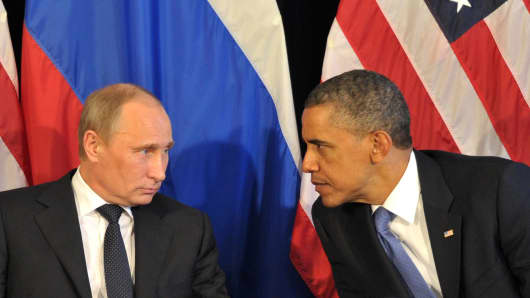The Boston Marathon bombings were a game changer.
As soon as those familiar with Russia and its surrounding regions heard the names of the suspects, we thought: Chechnya.
Some were careful to make distinctions. Maybe they were from neighboring Dagestan or Ingushetia?
To Russians, there is no difference.
Though I emigrated from the former Soviet Union to the United States in 1991, I always knew about Chechnya. Not because my family had any ties to the region, but because anyone who spent any considerable amount of time in Russia knew how the Russians felt about their neighbors to the south.
"Chechentsi" were the "other people."
"Animals!" many Russians would say to me when I went back to visit.
Throughout college, I wrote, researched, and interviewed people on both sides of the conflict, trying to make some sense of the horrendous violence that preceded my college years and that which would come after.
And now, the rest of America is curious as well.
Violence in largely Muslim Chechnya, and subsequently Russia, does not span decades. It spans centuries.
Americans are probably most familiar with more recent manifestations:
- The hostage crisis at Dubrovka Theater in Moscow in 2002. Among the armed Chechen terrorists were women. Over 120 people dead.
- The Beslan School Massacre in 2004. Over 300 people killed, including 186 children.
- The 2010 Moscow Metro bombings where two women blew themselves up causing more death and destruction. Chechen Islamist leader Doku Umarov, sometimes referred to as the "Osama bin Laden of Russia," claimed responsibility.
Putin's Vindication?
We've now heard from the Command of Mujahedeen of Caucasus Emirate's Dagestan Province as well as from a Chechen militant group--neither of which claimed responsibility for the attacks in Boston.
Regardless, the link to Chechnya, in one form or another, is there. And it's important.
For decades, one of Russia's biggest complaints about the United States was its seemingly sympathetic stance toward Chechens seeking independence. The Russian government detested U.S. statements calling Chechen rebels freedom fighters, instead of as Russia would have preferred—terrorists.
The Kremlin is hoping that this attack, allegedly by two ethnic Chechen brothers—will spark a different approach in how America responds to Russia's handling of Chechnya.
More Cooperation or More "I Told You So?"
When I was covering the Moscow airport bombings in 2011, a counter-terrorism analyst I had interviewed brought up an important point:
If those responsible for the attack were training in the tribal regions of Pakistan, would Moscow be justified to go into Pakistan to try to find the perpetrators? Would it have to ask the U.S. for permission?
Now, we ask those questions again.
What would and should the U.S. reaction be if Tamerlan Tsarnaev, the elder brother who traveled to Russia for six months last year, had links to Chechen militants?
Though much has been written about a renewed chapter in Russia- U.S. cooperation in light of all this, sources with knowledge of the Kremlin say otherwise.
They believe the Tsarnaev brothers acted independently, with some guidance from one or two mentors.
"Anti-Americanism within Russia is only getting worse, and these events will not change anything. Russia and America already cooperate when it comes to terror-related issues, and this will not change much," said one source who asked not to be named.
Commentaries on Russian websites, meantime, are flooded with accusations that "this was just a dress rehearsal for Sochi," the Black Sea home city of the 2014 Winter Olympics.
A Father's Roots
Russian newspaper "Izvestia" conducted an interview with Anzar Tsarnaev, the father of the suspects, shortly after he found out that his sons were accused of carrying out the attack. The father emigrated to the United States but moved back to Dagestan in the Caucuses of southern Russia, while his sons stayed in the Boston area.
Though much has been made of his comments defending his sons and saying that they were framed, closer attention should be drawn to another part of the interview, translated below:
Q: Why did you, yourself leave the U.S.?
A: I came back to my motherland to die. I had a brain hemorrhage. I was convinced that this was the end. But I was able to recover here, like crawling out of my grave. But my sons stayed there.
He used the word "rodina," which means motherland, or land of birth. When one invokes that term, it usually suggests a very close affinity to that place, a longing to be back where one came from.
The sons also demonstrated strong sentiments about their homeland, as seen in their numerous posts on social media.
What Now?
Russia's cooperation will be important in this case, but it does not necessarily mean that other contentions between the U.S. and Russia will be resolved.
Perhaps the suspects never really assimilated into life in the U.S., and experts say their emigration from such a violent region as children certainly influenced their character as adults.
I spoke to my own father shortly after Dzhokhar Tsarnaev was captured. He said he didn't even know the word "terrorist" growing up in the 1960s and '70s in the outskirts of Moscow.
Before he left for America in the late 1980s, though, it had become clear that we were living in a different world.
And that different world has made its way to America, in the worst way possible.
Dina Gusovsky is a former anchor/correspondent for Russia Today. She emigrated to the United States from Moscow in 1991.



